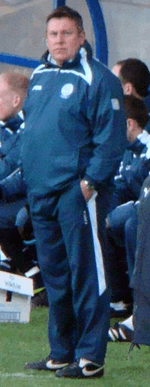Craig Shakespeare
 | |||
| Personal information | |||
|---|---|---|---|
| Full name | Craig Robert Shakespeare | ||
| Date of birth | 26 October 1963 | ||
| Place of birth | Birmingham, England | ||
| Height | 5 ft 10 in (1.78 m) | ||
| Playing position | Midfielder | ||
| Club information | |||
Current team | Leicester City (Assistant Manager) | ||
| Senior career* | |||
| Years | Team | Apps† | (Gls)† |
| 1981–1989 | Walsall | 284 | (45) |
| 1989–1990 | Sheffield Wednesday | 17 | (0) |
| 1990–1993 | West Bromwich Albion | 112 | (12) |
| 1993–1997 | Grimsby Town | 106 | (10) |
| 1997–1998 | Scunthorpe United | 4 | (0) |
| 1998–1999 | Telford United | ? | (?) |
| 2000 | Hednesford Town | 1 | (0) |
| Teams managed | |||
| 2006 | West Bromwich Albion (caretaker) | ||
| 2008–2010 | Leicester City (assistant) | ||
| 2010–2011 | Hull City (assistant) | ||
| 2011– | Leicester City (assistant) | ||
|
* Senior club appearances and goals counted for the domestic league only. | |||
Craig Robert Shakespeare (born 26 October 1963 in Birmingham) is a former professional footballer who went on to become a football coach. He is currently assistant manager at Leicester City.
Playing career
In his playing days he was an attacking midfielder; he favoured his left foot and his preferred position was on the left side of midfield. He signed as an apprentice at Walsall F.C. in September 1979, turning professional in November 1981. Shakespeare rates his goal in a 2–2 League Cup draw against Chelsea in October 1984 as the best of his career.[1] In 1987–88 he helped Walsall to win promotion to Division Two via the playoffs, an achievement which he has since described as his greatest in football.[1] He played well over 350 games for the Saddlers, scoring 59 goals, and in 1989 he moved to Sheffield Wednesday, then in the First Division, for a fee of £300,000.
He spent less than a year at Hillsborough, before moving to West Bromwich Albion F.C. for £275,000. He stayed at Albion for over three years, making 128 appearances in total and becoming the team's first choice penalty taker. He scored twice from the penalty spot in Albion's first ever game in the Third Division, a 6–3 victory over Exeter City in August 1991.
Albion were promoted in 1993, but Shakespeare moved to Grimsby Town, rejoining Alan Buckley under whom he had played at Walsall. He later moved on to Scunthorpe United, and also played for three non-league clubs before retiring.
Coaching career
In 1999 he rejoined West Brom as Football in the Community Officer. In this role he was responsible for promoting football at grass roots level in the local community. He later took up the post of academy coach, then in 2006 became Reserve Team Coach. In October 2006, following the departure of Bryan Robson and then his assistant Nigel Pearson (who had been caretaker manager for a period of four weeks), Shakespeare was given charge of the first team for one game pending the arrival of Tony Mowbray.[2] The game was away to Crystal Palace; Albion won 2–0.[3]
Shakespeare left Albion in June 2008 to become Pearson's assistant manager at Leicester City,[4] a move that was confirmed on 1 July.[5] As well as having worked together on the West Bromwich Albion coaching staff, the two had also played together at Sheffield Wednesday. Shakespeare once said that Pearson was the best captain he had ever played under.[6] Shakespeare then followed Nigel Pearson, first to Hull City and then back to Leicester City when Pearson was reappointed manager there in November 2011. Following Pearson's sacking in July 2015, Shakespeare remained as assistant manager to incoming manager Claudio Ranieri.
Honours
Walsall
- Third Division play-off winner: 1988
References
- 1 2 "Pick a Number...". West Bromwich Albion F.C. 6 November 2007. Retrieved 6 November 2007.
- ↑ "Pearson stands down at West Brom". BBC Sport. 17 October 2006. Retrieved 27 May 2007.
- ↑ "Shakey enjoys night in spotlight". West Bromwich Albion F.C. 18 October 2006. Retrieved 12 November 2007.
- ↑ "Shakespeare leaves Albion". West Bromwich Albion F.C. 27 June 2008. Retrieved 28 June 2008.
- ↑ "Pearson Adds Duo To Backroom Staff". LCFC.co.uk. 1 July 2008. Retrieved 1 July 2008.
- ↑ "Craig Shakespeare – Simply the Best". West Bromwich Albion F.C. 15 May 2007. Retrieved 16 July 2008.
External links
- Profile on West Bromwich Albion F.C. official site
- electronicfishcake.com player profile
- Craig Shakespeare career statistics at Soccerbase
| ||||||